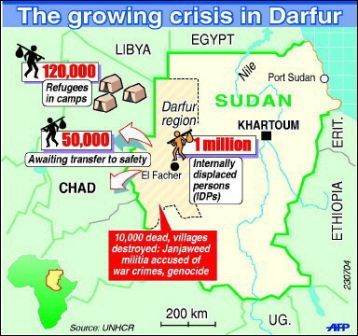UNHCR warns of new mass exodus of Darfur refugees to Chad
KHARTOUM, Aug 20 (AFP) — Some 30,000 displaced people living in a camp close to Sudan’s border with Chad are threatening to join a mounting exodus of refugees unless an international force provides security, the office of the UN High Commissioner for Refugees warned.
“We are concerned that such an influx of 30,000 refugees in one single spot along the Chad-Sudan border, if it were to materialize, would put a strain on our ability to care for and feed refugees in our camps there,” the UN agency said.
 The UNHCR’s director of Sudan operations, Jean-Marie Fakhouri, met with representatives in the camp at Masteri, 50 kilometers south of Geneina, the capital of West Darfur State.
The UNHCR’s director of Sudan operations, Jean-Marie Fakhouri, met with representatives in the camp at Masteri, 50 kilometers south of Geneina, the capital of West Darfur State.
“This group of displaced people said they want protection from UN peacekeepers,” the agency’s statement said.
“If they do not get international security guarantees, they said they will all cross to Chad as soon as the rain-swollen river that marks the border with Sudan dries up.”
Most of the displaced people in the Masteri camp fled attacks on their own villages earlier this year, but are still prey to the depredations of the state-sponsored Arab militias let loose in Darfur after an ethnic minority uprising early last year, the UNHCR said.
“When they venture outside, they are regularly attacked by Janjaweed militiamen.
“A 43-year-old woman told members of Fakhouri’s team that she was one of many women who had been raped when she went out of Masteri for food and firewood.
“She said women are being raped every day, but they continue to go out because the men will be killed if they venture out.”
Refugees interviewed at the border and at UNHCR camps in Chad say there are thousands of others waiting to cross.
They say the Sudanese authorities are exerting military pressure and carrying out propaganda campaigns on the radio and through village chiefs to prevent them from leaving.
“The refugees said they had been told that there was no help for them in Chad,” the UNHCR statement said.
“In some cases they said they were promised food and water to help them survive after their villages had been burned, but the promised aid never arrived and the attacks on their villages continued.”
Numerous refugees interviewed by UNHCR staff said they had been able to cross only after hiding from the Janjaweed and military, and by travelling at night to avoid detection.
A number of refugees said they had crossed back into Sudan occasionally to take care of cattle they left behind or see relatives who could not make the trip because of age or health.
“But they said they returned to Chad after being attacked by Janjaweed and military forces who also decimated their cattle herds,” the agency said.
“Overall, 7,345 spontaneous arrivals have been registered so far this month at four of our nine camps: Breidjing, Oure Cassoni, Mile and Konoungo.
“The refugees say that with supplies dwindling and their animals dead or stolen, the refugee camps have become their only chance for survival.”
Some 200,000 refugees from Darfur have already fled to Chad. But the United Nations says there are more than million more people who have been displaced from their homes inside Sudan.
